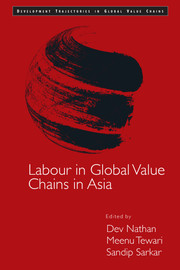Book contents
- Frontmatter
- Contents
- Figures
- Tables
- Foreword
- Preface
- Acknowledgements
- Introduction
- Captive Governance
- Modular Governance
- 11 From Disposable to Empowered: Rearticulating Labour in Sri Lankan Apparel Factories
- 12 Scripted Performances? Local Readings of ‘Global’ Health and Safety Standards in the Apparel Sector in Sri Lanka
- 13 Diffusing Labour Standards Down and Beyond the Value Chain: Lessons from the Mewat Experiment
- 14 Social Upgrading in Mobile Phone GVCs: Firm-level Comparisons of Working Conditions and Labour Rights
- 15 The Politics of Global Production: Apple, Foxconn and China's New Working Class
- 16 New Strategies of Industrial Organization and Labour in the Mobile Telecom Sector in India
- 17 Global Production Networks and Labour Process
- Relational Governance
- Conclusions
- Notes on Contributors
- Index
12 - Scripted Performances? Local Readings of ‘Global’ Health and Safety Standards in the Apparel Sector in Sri Lanka
from Modular Governance
Published online by Cambridge University Press: 23 July 2017
- Frontmatter
- Contents
- Figures
- Tables
- Foreword
- Preface
- Acknowledgements
- Introduction
- Captive Governance
- Modular Governance
- 11 From Disposable to Empowered: Rearticulating Labour in Sri Lankan Apparel Factories
- 12 Scripted Performances? Local Readings of ‘Global’ Health and Safety Standards in the Apparel Sector in Sri Lanka
- 13 Diffusing Labour Standards Down and Beyond the Value Chain: Lessons from the Mewat Experiment
- 14 Social Upgrading in Mobile Phone GVCs: Firm-level Comparisons of Working Conditions and Labour Rights
- 15 The Politics of Global Production: Apple, Foxconn and China's New Working Class
- 16 New Strategies of Industrial Organization and Labour in the Mobile Telecom Sector in India
- 17 Global Production Networks and Labour Process
- Relational Governance
- Conclusions
- Notes on Contributors
- Index
Summary
Introduction
Safe working places are a cornerstone for enabling worker welfare in factory settings. Occupational health and safety (OHS) is perceived as most ‘straightforward’ for implementation and where forward movement has been made under voluntary global governance regimes (Brown, 2009; Barrientos and Smith, 2007). OHS, however, is a disputed arena as it essentially encapsulates the perennial conflict between state, capital, and labour.
Ethical codes are an important instrument of global governance in the garment trade, where the issue of OHS has evolved rapidly because of its auditable nature (Barrientos and Smith, 2007; Clean Clothes Campaign, 2005). However, growing evidence suggests that problems abound in OHS systems in global supply chains. For example, factories generally lack on-site OHS professionals, and there have been significant challenges to the implementation and effectiveness of monitoring mechanisms (Brown, 2009; Miller, 2011; O'Rourke, 2000). Consequently, factory fires and collapses continue to plague the industry with devastating and deadly consequences for workers, especially in Bangladesh and Pakistan, as the collapse of Spectrum Factory and Rana Plaza testified (Brown, 2011, 2012; Day, 2010; Miller, 2009, 2011). In contrast, neighbouring Sri Lanka has evaded this negative publicity, and the media tends to portray the Sri Lankan apparel industry as an ‘ethical’ supplier that takes global governance regimes seriously—an image that the industry has strategically cultivated (Karp, 1999; O'Leary, 2009). The idea that labour's health and safety fare well in these settings is very much taken for granted.
De Neve (2009), however, rightly reminds us that there is also a politics of compliance—in so far as ‘ethical corporate regulations are shaped by and constitutive of power relations in the global market’ (2009, p. 63). His interventions underscore the point that the neoliberal global economy is ‘rooted in, and shaped by, particular social practices, cultural mores and institutional frameworks’, which result in erratic distinctions in myriad spatial locations (Wills, 1999, p. 446). This particular grounding, as labour geographers have suggested, matters for worker agency but also requires appreciating their spatial choices within ‘capitalisms unevenly developed geography’ (Herod, 2012, p. 21; Castree, 2007). Moreover, Castree (2007) notes the need to be attentive to the social and cultural tapestry of workers’ social lives, signalling that how workers live outside workplaces also matters for labour geography. My contention is that these sociocultural spheres are never neatly left behind when labour enters workplaces.
- Type
- Chapter
- Information
- Labour in Global Value Chains in Asia , pp. 265 - 286Publisher: Cambridge University PressPrint publication year: 2016
- 2
- Cited by

